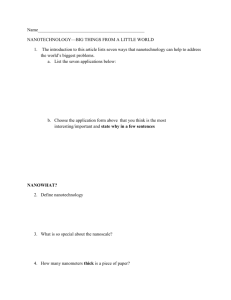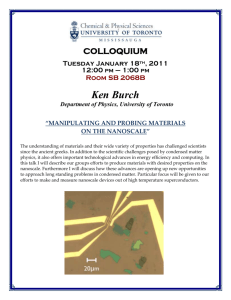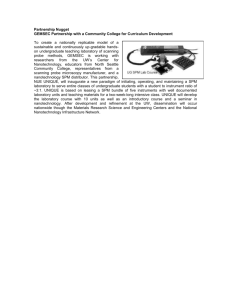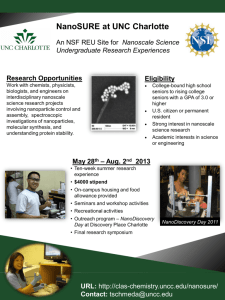Nanotechnology Undergraduate Education (NUE)
advertisement
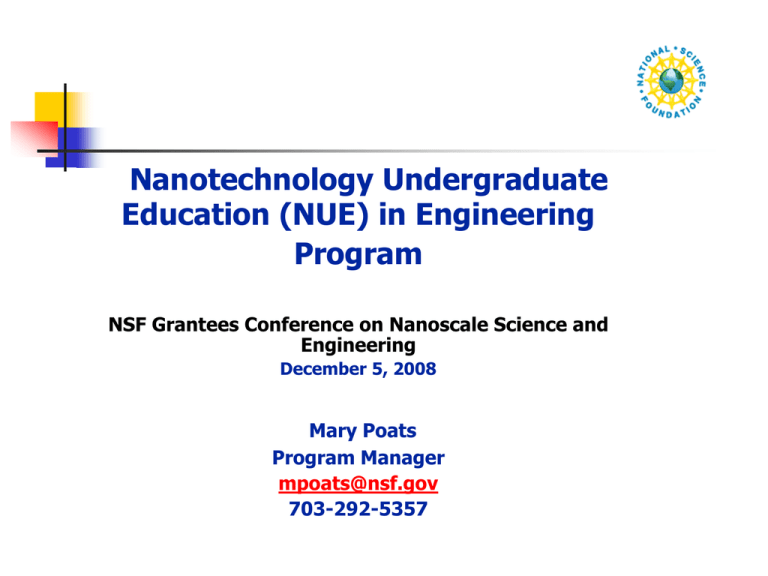
Nanotechnology Undergraduate Education (NUE) in Engineering Program NSF Grantees Conference on Nanoscale Science and Engineering December 5, 2008 Mary Poats Program Manager mpoats@nsf.gov 703-292-5357 NUE Program History Part of the 25-agency, $1.3 B/year (FY 06), National Nanotechnology Initiative (NNI) Initiated in FY 2003 as one of four components in NSF Nanoscale Science and Engineering (NSE) Program including: Nanoscale Interdisciplinary Research Teams (NIRT), Nanoscale Exploratory Research (NER), and Nanoscale Science and Engineering Centers (NSEC) Cross-directorate program-MPS, ENG, SBE, EHR, CISE, and BIO MPS Chemistry lead organization-FY 2003 and FY 2004 NUE Program History Funding level: $100K/12 months-FY 2003 and FY 2004; freshman and sophomore levels only FY 2005 ENG takes over management with EHR and SBE as partners funding level/duration increased to $200K/24 months FY 2006-all levels participate; focus on nanoscale engineering with relevance to devices and systems and/or social, economic and ethical issues surrounding nanotechnology FY 2007-title changed to NUE in Engineering; eligibility requirements changed NUE Program Statistics Props. Awards 33 Success Rate 41% Total NUE $M* 3.3 FY 03 80 FY 04 70 34 48% 3.3 FY 05 87 14 16% 2.7 FY 06 114 11 9% 2.1 FY 07 75 12 16% 2.3 FY 08 67 12 18% 2.3 *MPS, EHR, SBE, CISE, BIO, EPSCoR NUE Contributes to NSF Strategic Goals The NUE in Engineering program is a significant contributor to achieving the NSF goal of fostering research that will advance the frontiers of knowledge, emphasizing areas of greatest opportunity and potential benefit and establishing the nation as a global leader in fundamental and transformational science and engineering. In addition, NUE helps to expand the scientific literacy of U.S. citizens particularly in nanoscale science, engineering, and technology. NUE Program Objectives Integrate nanoscale science, engineering, and technology into undergraduate engineering curricula; Generate practical ways of introducing nanotechnology into undergraduate engineering education with a focus on devices and systems and/or on the social, economic, and ethical issues that surround nanotechnology; NUE Program Characteristics The NUE Program emphasizes new approaches to undergraduate engineering education through interdisciplinary collaborations that could lead to, but not limited to: New examples of undergraduate engineering courses that are presented through development of laboratory and demonstration experiments, manuals and other written materials, software, and web-based resources; NUE Program Characteristics Development and dissemination of new teaching modules for nanoscale engineering of relevance to engineering education that can be used in existing undergraduate courses; Incorporation of undergraduate research opportunities in nanoscale engineering into the curriculum at any level; and NUE Program Characteristics Development of courses or curricular enhancements related to nanoscale engineering and technology and environmental or social change. NUE: Teaching Nanosystems Engineering with Active Learning Experiences Louisiana Tech University, EEC-0407097,Hisham Hegab Preparing a diverse, globally engaged STEM workforce Impacted students from elementary school to sophomore-level undergraduates Helped establish first B.S. in Nanosystems Engineering degree program in the U.S. 25 undergraduates enrolled, 1st program graduates-May 2007 NUE: Developing Undergraduate Nanoscale Experiences for the Sciences (Project DUNES) University of Northern Colorado, Greeley, CO (0532516) K. Pacheco, A. Morrow-Baker, J. Moore, R. Schwenz, J. Suits To accomplish their goals concerning nanotechnology education at the University of Northern Colorado, the project team is: incorporating a series of nanoscale science modules into currently offered laboratory courses and implementing use of a common instrument across these courses offering summer internships for undergraduate pre-service teachers where they help develop and implement the nanoscale science modules providing students the opportunity to participate in interdisciplinary learning communities focused on nanoscale science The overall project will impact a large number of students, many of which are from groups underrepresented in STEM disciplines. UNC has 9,934 undergraduate students, of whom 1,332 (13.9%) are minorities. The program will impact courses including STEM degree requirements, General Education requirements, and pre-service teacher education requirements, or about 22% of a UNC STEM student’s load, and 5% of a nonSTEM student’s load. NUE: A Freshman-Level Introduction to Nanotechnology Based on Scanning Probe Instruments PI: Wolfgang Porod, University of Notre Dame (CCR-0304089) • Developed and implemented new course module Timer and shift register Arm • Module offered to all ND Engineering freshmen • Students build LEGO model of scanning-probe instrument, after IBM Millipede nanotechnology data-storage concept • Organized workshop to introduce new module • Partnered with FIRST LEGO League to create Nano Quest challenge, and some 75,000 youths ages 9-14 participated worldwide Table RCX bricks NUE: Integrating Nanoscale Science Education and Student Research at Jackson State University T. V. Shahbazyan, W. Walters, F. Hagelberg, Jackson State University NUE - 0532468 The JSU nanotechnology student training laboratory is equipped with: educational atomic force microscope educational scanning tunneling microscope desktop scanning electron microscope Current Student Research Study of Carbon Nanotube based paint systems exposed to harsh environmental conditions Environmental durability of Carbon Nanotube based polymers for potential flexible display applications nano-carbon tubules observed using scanning tunneling microscopy NUE in Engineering Program Future FY 2009 competition Program solicitation in revision Spring 2009 deadline $1.9M/10 awards (est.) ENG, EHR, SBE participating Directorates
